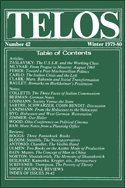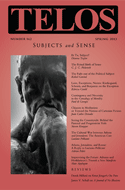By Robert Wyllie · Tuesday, October 22, 2013 As an occasional feature on TELOSscope, we highlight a past Telos article whose critical insights continue to illuminate our thinking and challenge our assumptions. Today, Robert Wyllie looks at Alain Manville’s “Hegel and Metaphysics,” from Telos 42 (Winter 1979).
 In “Hegel and Metaphysics,” Alain Manville joins the echelon of French theorists who attempt to focalize Hegelianism around one core concept. In the vanguard, Jean Wahl turned unhappy consciousness into an organizing principle for reading Hegel. More famously, Alexandre Kojève pared Hegelianism down to the core master-slave dialectic. Manville focuses upon the annihilation of metaphysics in Hegel’s speculative recognition that being equals nothingness. Speculative thought transcends the understanding (Vernunft), which sees only an ontological contradiction. Hegel dismisses Vernunft and metaphysics, Manville argues, to grasp concrete reality in a postmetaphysical sense. In “Hegel and Metaphysics,” Alain Manville joins the echelon of French theorists who attempt to focalize Hegelianism around one core concept. In the vanguard, Jean Wahl turned unhappy consciousness into an organizing principle for reading Hegel. More famously, Alexandre Kojève pared Hegelianism down to the core master-slave dialectic. Manville focuses upon the annihilation of metaphysics in Hegel’s speculative recognition that being equals nothingness. Speculative thought transcends the understanding (Vernunft), which sees only an ontological contradiction. Hegel dismisses Vernunft and metaphysics, Manville argues, to grasp concrete reality in a postmetaphysical sense.
Continue reading →
By Rebecca Gould · Wednesday, April 10, 2013 Rebecca Gould’s “Laws, Exceptions, Norms: Kierkegaard, Schmitt, and Benjamin on the Exception” appears in Telos 162 (Spring 2013). Read the full version online at the Telos Online website, or purchase a print copy of the issue in our store.
 The concept of the exception has heavily shaped modern political theory. In modernity, Kierkegaard was one of the first philosophers to propound the exception as a facilitator of metaphysical transcendence. Merging Kierkegaard’s metaphysical exception with early modern political theorist Jean Bodin’s theory of sovereignty, Carl Schmitt introduced sovereignty to metaphysics. He thereby made an early modern concept usable in a post-metaphysical world. This essay carries Schmitt’s appropriation one step further. Drawing on Walter Benjamin’s replacement of transcendental metaphysics with contingent creaturehood, it reintroduces the anti-foundationalist concept of repetition that was implicit in Kierkegaard’s paradigm but which was not made lucid until Benjamin crafted from the Schmittian exception a vision of political life grounded in creaturely existence. The concept of the exception has heavily shaped modern political theory. In modernity, Kierkegaard was one of the first philosophers to propound the exception as a facilitator of metaphysical transcendence. Merging Kierkegaard’s metaphysical exception with early modern political theorist Jean Bodin’s theory of sovereignty, Carl Schmitt introduced sovereignty to metaphysics. He thereby made an early modern concept usable in a post-metaphysical world. This essay carries Schmitt’s appropriation one step further. Drawing on Walter Benjamin’s replacement of transcendental metaphysics with contingent creaturehood, it reintroduces the anti-foundationalist concept of repetition that was implicit in Kierkegaard’s paradigm but which was not made lucid until Benjamin crafted from the Schmittian exception a vision of political life grounded in creaturely existence.
Continue reading →
|
|
 In “Hegel and Metaphysics,” Alain Manville joins the echelon of French theorists who attempt to focalize Hegelianism around one core concept. In the vanguard, Jean Wahl turned unhappy consciousness into an organizing principle for reading Hegel. More famously, Alexandre Kojève pared Hegelianism down to the core master-slave dialectic. Manville focuses upon the annihilation of metaphysics in Hegel’s speculative recognition that being equals nothingness. Speculative thought transcends the understanding (Vernunft), which sees only an ontological contradiction. Hegel dismisses Vernunft and metaphysics, Manville argues, to grasp concrete reality in a postmetaphysical sense.
In “Hegel and Metaphysics,” Alain Manville joins the echelon of French theorists who attempt to focalize Hegelianism around one core concept. In the vanguard, Jean Wahl turned unhappy consciousness into an organizing principle for reading Hegel. More famously, Alexandre Kojève pared Hegelianism down to the core master-slave dialectic. Manville focuses upon the annihilation of metaphysics in Hegel’s speculative recognition that being equals nothingness. Speculative thought transcends the understanding (Vernunft), which sees only an ontological contradiction. Hegel dismisses Vernunft and metaphysics, Manville argues, to grasp concrete reality in a postmetaphysical sense.  The concept of the exception has heavily shaped modern political theory. In modernity, Kierkegaard was one of the first philosophers to propound the exception as a facilitator of metaphysical transcendence. Merging Kierkegaard’s metaphysical exception with early modern political theorist Jean Bodin’s theory of sovereignty, Carl Schmitt introduced sovereignty to metaphysics. He thereby made an early modern concept usable in a post-metaphysical world. This essay carries Schmitt’s appropriation one step further. Drawing on Walter Benjamin’s replacement of transcendental metaphysics with contingent creaturehood, it reintroduces the anti-foundationalist concept of repetition that was implicit in Kierkegaard’s paradigm but which was not made lucid until Benjamin crafted from the Schmittian exception a vision of political life grounded in creaturely existence.
The concept of the exception has heavily shaped modern political theory. In modernity, Kierkegaard was one of the first philosophers to propound the exception as a facilitator of metaphysical transcendence. Merging Kierkegaard’s metaphysical exception with early modern political theorist Jean Bodin’s theory of sovereignty, Carl Schmitt introduced sovereignty to metaphysics. He thereby made an early modern concept usable in a post-metaphysical world. This essay carries Schmitt’s appropriation one step further. Drawing on Walter Benjamin’s replacement of transcendental metaphysics with contingent creaturehood, it reintroduces the anti-foundationalist concept of repetition that was implicit in Kierkegaard’s paradigm but which was not made lucid until Benjamin crafted from the Schmittian exception a vision of political life grounded in creaturely existence. 






